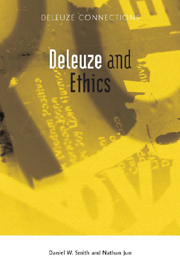Book contents
- Frontmatter
- Contents
- Acknowledgments
- Introduction
- 1 Whistle While You Work: Deleuze and the Spirit of Capitalism
- 2 The Ethics of the Event: Deleuze and Ethics without Aρχή
- 3 While Remaining on the Shore: Ethics in Deleuze's Encounter with Antonin Artaud
- 4 Responsive Becoming: Ethics between Deleuze and Feminism
- 5 Deleuze, Values, and Normativity
- 6 Ethics and the World without Others
- 7 Deleuze and the Question of Desire: Towards an Immanent Theory of Ethics
- 8 “Existing Not as a Subject But as a Work of Art”: The Task of Ethics or Aesthetics?
- 9 Deleuze, Ethics, Ethology, and Art
- 10 Never Too Late? On the Implications of Deleuze's Work on Death for a Deleuzian Moral Philosophy
- 11 Ethics between Particularity and Universality
- Notes on Contributors
- Index
Introduction
Published online by Cambridge University Press: 12 September 2012
- Frontmatter
- Contents
- Acknowledgments
- Introduction
- 1 Whistle While You Work: Deleuze and the Spirit of Capitalism
- 2 The Ethics of the Event: Deleuze and Ethics without Aρχή
- 3 While Remaining on the Shore: Ethics in Deleuze's Encounter with Antonin Artaud
- 4 Responsive Becoming: Ethics between Deleuze and Feminism
- 5 Deleuze, Values, and Normativity
- 6 Ethics and the World without Others
- 7 Deleuze and the Question of Desire: Towards an Immanent Theory of Ethics
- 8 “Existing Not as a Subject But as a Work of Art”: The Task of Ethics or Aesthetics?
- 9 Deleuze, Ethics, Ethology, and Art
- 10 Never Too Late? On the Implications of Deleuze's Work on Death for a Deleuzian Moral Philosophy
- 11 Ethics between Particularity and Universality
- Notes on Contributors
- Index
Summary
It is customary to introduce a book of this sort by offering a brief overview of its essays and articles. I hope the reader will forgive me for straying from this convention – conventions being, after all, somewhat beside the point in a book about Deleuze. (A quick glance at each chapter's opening will prove sufficient to glean its gist and will hopefully serve to pique your interest as well.) Instead, I want to provide an introduction which is, one might say, apologetic rather than synoptic. Specifically, I want to stumble in the general direction of explaining why I think this volume is relevant, timely, and at least marginally important. Why Deleuze? Why ethics? Why now, and why ought we to care?
Ten years into the Deleuzian century, and fifteen since la mort de la même, few would disagree that the world as we know it is sinking into an economic, political, social, and ethical abyss of previously unimaginable depths. Back in the halcyon days when that world was still in its infancy, Deleuze was widely heralded as a visionary who would help us demystify the web of global technological and financial networks which was, at that time, just starting to be spun. Since then, the prophecies have largely come to pass; everyone from Žižek to Badiou is fond of saying that the conceptual and methodological tools with which we make sense of this age are Deleuzian tools.
- Type
- Chapter
- Information
- Deleuze and Ethics , pp. 1 - 4Publisher: Edinburgh University PressPrint publication year: 2011



